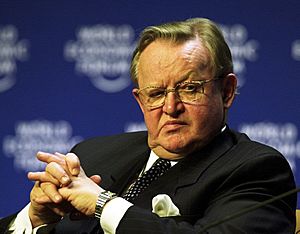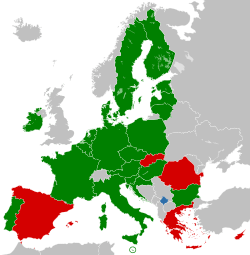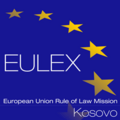European Union Rule of Law Mission in Kosovo facts for kids
The European Union Rule of Law Mission in Kosovo, often called EULEX Kosovo, is a special agreement between the European Union and Kosovo. Through this agreement, several countries in the European Union send police officers, judges, and lawyers to help make Kosovo a safer place. This idea came from a plan known as the Ahtisaari plan. The goal is to continue having international police forces help the local police in Kosovo, as first planned by the United Nations Security Council Resolution 1244. Some countries, like Russia and Serbia, did not agree with this mission. The plan was to have about 2,000 police officers and legal experts on the ground. The mission started sending its people to Kosovo on February 16, 2008.
Contents
What EULEX Does and Who Is There

The European Council, which is a group of leaders from EU countries, decided on December 14, 2007, to send about 1,800 to 1,900 people. Because the political situation was a bit difficult, this number was later increased to 2,000 people. This was mainly because it was hard to reach an agreement with Serbia.
Most of the people in the EULEX mission are police officers. Some of these officers have special training to help control large crowds if there are protests. Other people in the mission are prosecutors, who bring legal cases, and judges, who make decisions in court. Because so many people are working for EULEX, it became the largest group of EU staff working outside of Brussels, which is where the EU's main offices are.
The mission was expected to cost about €165 million in its first year. The final decision to start the mission was delayed a few times. This was partly because of an election in Serbia and other political discussions. Some countries, like Spain, waited to join until they were sure how the mission would work with the United Nations' previous efforts in Kosovo.
Besides countries from the European Union, other countries like Turkey, Switzerland, Norway, and the United States also sent people to be part of EULEX.
Political Views on the Mission
The countries within the European Union have different opinions about Kosovo. Some EU countries believe Kosovo should be an independent country, while others do not. However, the EU leaders said that countries could still send people to join the EULEX mission, even if they didn't officially recognize Kosovo as an independent state.
The EU stated that the mission would follow United Nations Security Council Resolution 1244. This resolution set up international rule in Kosovo back in 1999. However, the EU force did not get a new direct order from the UN Security Council. This was because Russia disagreed and stopped the UN mission from officially handing over its duties to the EU. According to Serbia, the EULEX mission suggested that the EU recognized Kosovo as an independent country, which Serbia did not agree with.
Countries Sending Troops to Kosovo
Many countries sent people to help with the EULEX mission. Here are a few examples:
 Germany: Germany sent around 600 soldiers to help keep the peace.
Germany: Germany sent around 600 soldiers to help keep the peace. Italy: Italy also sent about 600 soldiers as peacekeepers.
Italy: Italy also sent about 600 soldiers as peacekeepers. United Kingdom: On April 25, 2008, the United Kingdom announced it would send a group of about 600 soldiers from The Rifles, a light infantry battalion, to help keep public order.
United Kingdom: On April 25, 2008, the United Kingdom announced it would send a group of about 600 soldiers from The Rifles, a light infantry battalion, to help keep public order.
Images for kids
See also
 In Spanish: EULEX para niños
In Spanish: EULEX para niños
 | Anna J. Cooper |
 | Mary McLeod Bethune |
 | Lillie Mae Bradford |



